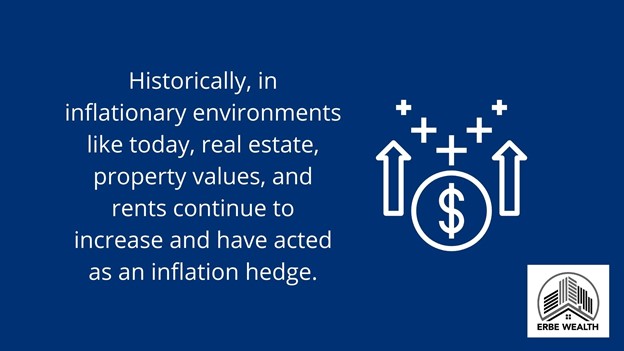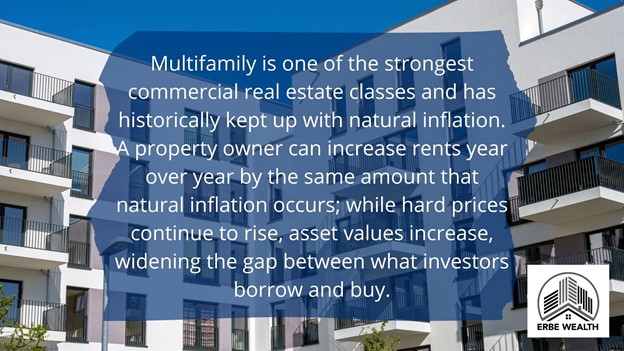Inflation
by Erbe Wealth · Published · Updated
Let’s talk about inflation.
U.S. inflation increased to 7.5% in January 2022, which is a 40 year high. I talk to many people daily who are very on edge about rising inflation, and why shouldn’t they be when our dollar’s value is disappearing right before our very eyes. With rising inflation in mind, investors often ask me if our real estate syndications are a good hedge against inflation or if they should stay in the stock market.
Inflation’s been a big topic among economists and investors in 2021 and 2022. We’ve seen the cost of materials, goods, and rents, to name a few, skyrockets after the release of trillions of government stimulus to provide economic relief from the pandemic shutdowns. Interest rates are still really low, and there’s an expectation that they’ll probably stay low into 2023.
My investors want to know where the best place to park their dollars is in this inflationary world. I believe the answer is private real estate investments that hold asset classes like multifamily apartment communities?
Why? For one, they give you all the tax benefits that private and direct ownership gets you. Multifamily real estate is historically one of the strongest asset classes to achieve capital preservation. It is a safe investment that provides day one returns on the investor’s capital contributions. We specialize in stabilized cash-flowing properties at market value, also known as value-add assets. They allow us to earn a greater rate of return on the dollar than anywhere else. The time value of money is crucial, and cash-flowing assets provide that.
Historically, in inflationary environments like today, real estate, property values, and rents continue to increase and have acted as an inflation hedge.

What is Inflation?
Inflation is the increase in the price of goods and services in a given economy over a certain period of time. Basically, it means that prices generally go up each year, which means that your purchasing power or value of a dollar decreases each year. Historically, what I’ve seen for most of my life is inflation increasing at about 2% to 3% percent a year.
So why do you say real estate syndications are a great hedge against inflation?
Historically if you’ve invested in a strong market, rent should naturally increase on average of two to three percent a year, which is a strong hedge against the natural inflation we’ve seen up to this point. It has kept pace with inflation. But we are in 2022, so I will give you four reasons why real estate syndication is a great hedge against inflation.
Number 1: Tangible Value
Real estate is a hard asset. Unlike soft assets such as stocks and bonds, hard assets hold their intrinsic value due to natural scarcity and limited supply. Real estate is unique because it has two components of tangible value, which means real estate has BOTH a limited supply and provides basic human needs.
In multi-family real estate, the asset is composed of land and buildings. As my dad used to say, “God only made a certain amount of land; it’s finite.” The asset also consists of a building(s). There is currently a supply shortage across the United States for affordable housing, which is driving property prices up. Combined with that, there is a mass migration occurring in our country that my partners and I are well aware of and taking advantage. A great deal of people are relocating from certain states and specifically moving into other states.
This is rapidly changing the population of primarily the southern states and increasing their populations and economies. What we have known for years is this mass migration is making the housing shortage much more significant in those areas of population growth.
The housing shortage has been behind for years, really since the Great Recession. On top of that, the developers are having a hard time going out and building apartments and affordable housing because there’s such a shortage of supplies right now, and everything is so expensive. All of these factors are creating a “perfect storm” right now and making it probably one of the best times I’ve seen in my career to consider investing in established multifamily value-add properties.
I look for properties located in specific growing markets where, quite simply, the builders and developers cannot keep up with the growth. In many markets, we are projecting it’ll possibly take ten years to catch up with the housing needs in these communities.
Basically, investing in these properties becomes a supply and demand issue where there simply isn’t the supply for the demand of the product. This is why in the last few years, especially last year, we saw the rent increase hit 18% a year.
Number 2: Appreciating Value
The second reason real estate is an excellent hedge against inflation is its appreciating value.
Appreciating and asset values are some of the most significant ways real estate investors can build long-term growth. When you buy the right properties and manage them right, you’ll always win when you’re there for the long term. Asset prices continue to climb as cap rates are still compressing nationwide.

We primarily focus on value add real estate. Please check out my ARTICLE that I just put out about how we increase the value of commercial real estate, and that will show you what a powerful thing appreciation is in these assets that we buy.
Third Reason: Increase from Rents
The third reason real estate is an excellent hedge against inflation is the increase that comes from the rents.
Just as I explained a little bit ago, we do a real deep dive into the markets we look to invest in. We have found a niche of states in the southern United States that are experiencing a mass migration of people.
When we find a market, we check into everything about it: how fast the economy is growing, projected job growth, what industries are coming in, and what kind of long-term growth we are projected to see.
In a regular market, rental prices and income generally rise by two to three percent a year, which naturally offsets normal inflation. In addition, as inflation increases housing costs and the cost to operate, we continue to push that cost onto the tenants to offset it.
This is a unique time in which we are seeing rent growth for all the reasons I listed before. We have such a shortage, and that’s driving the rent increases up, so they are staying well ahead of inflation, even at 7.8 percent.
Fourth Reason: Depreciating Debt
The last reason inflation is a good hedge is depreciating debt.
Many people don’t think about this, and it is important. Inflation is basically there to erode the value of the dollar over time.
Today’s money is worth more than tomorrow’s money. Borrowers that use that debt to finance their real estate projects are essentially paying their lender back the money they took out, but each year that passes, the original principle of the loan is worth less than when they initially took on the debt.
Multifamily is one of the strongest commercial real estate classes and has historically kept up with natural inflation.
A property owner can increase rents year over year by the same amount that natural inflation occurs; while hard prices continue to rise, asset values increase, widening the gap between what investors borrow and buy.

Will Real Estate be a Good Hedge in the Future?
None of us have a crystal ball, but we can go back into the past and see that real estate has historically performed as a strong hedge against inflation, regardless of interest rates. You can see that even when you go back to the major inflationary environments through the 70s and 80s, rising prices and rents continued to increase at accelerated paces.
Multifamily real estate has proven to be one of the best investment opportunities during an inflationary period. It outperforms many other investments during times of inflation, and there are a couple of reasons why.
#1: Shorter Leases.
Multifamily leases are typically much shorter than commercial leases. For example, while a hospital may sign a 20 or 30-year lease, an apartment resident will likely sign for one year or less. These shorter leases provide the opportunity to increase rents much quicker than a commercial property, allowing multifamily properties to take advantage of inflation.
#2: Single-family home prices during inflationary periods.
It can be more challenging to purchase a home right now, and this can be seen almost everywhere. For example, I live in Denver, CO, where prices are currently insane. I heard on the news that the average home price in Denver is approaching $700,000, and when I went back to look at some details, home prices have increased nationally by over 13% percent since 2020. The home prices continue to go up and make it next to impossible for many first-time homebuyers to purchase. That results in them continuing to rent.
#3: Real estate values tend to rise during periods of inflation.
Because real estate is a leveraged asset, the value will continue to grow over time.
#4: Cash flow multifamily investing is a steady investment during inflationary periods as people always need a place to live.
Regardless of inflation, people need homes, and rent will be paid.
If you fear inflation, you don’t have to worry any longer. The answer is to place your money in investments whose value and generated income rise alongside inflation, like multifamily real estate because it has a tangible value as a place to live. It also has strong economic area data suggesting it’s a great place to invest for the foreseeable future. You can sleep easy knowing multifamily is aiding you in the fight against inflation.




